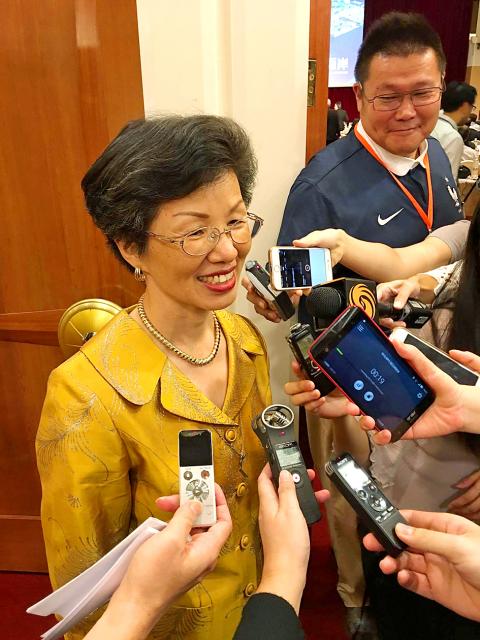Taiwanese academic Lu Li-an (盧麗安), who teaches at the College of Foreign Languages and Literature in Fudan University in Shanghai, is under investigation by the Mainland Affairs Council for potential violation of the Act Governing Relations Between the People of the Taiwan Area and the Mainland Area (兩岸人民關係條例).
Mainland Affairs Council Minister Katharine Chang (張小月) yesterday told reporters that questions concerning Lu’s nationality had been raised following her nomination to be a Chinese Communist Party (CCP) representative for the CCP’s 19th National Congress, which opens in Beijing on Oct. 18.
Lu and nine others were nominated to represent “Taiwan Province,” but she is the only one who was born in Taiwan.

Photo: Lin Liang-sheng, Taipei Times
The council has discovered that Lu, while born in Kaohsiung, elected to teach at Fudan University with her husband since returning from her studies in the UK in 1997, Chang said.
The council respects Lu’s choice to enter and leave Taiwan with her Chinese passport, Chang said.
However, the National Immigration Agency (NIA) is investigating whether Lu still holds her Republic of China (ROC) citizenship, Chang said.
Under the act, no Taiwanese can establish a residence or hold a Chinese passport, with violators being immediately stripped of their ROC citizenship.
Taiwanese are also prohibited from assuming positions in the CCP, the People’s Liberation Army, or the Chinese civil service.
If Lu still retains her ROC citizenship after the investigation, she would be expected to choose between ROC or Chinese citizenship, Chang said.

CHANGING LANDSCAPE: Many of the part-time programs for educators were no longer needed, as many teachers obtain a graduate degree before joining the workforce, experts said Taiwanese universities this year canceled 86 programs, Ministry of Education data showed, with educators attributing the closures to the nation’s low birthrate as well as shifting trends. Fifty-three of the shuttered programs were part-time postgraduate degree programs, about 62 percent of the total, the most in the past five years, the data showed. National Taiwan Normal University (NTNU) discontinued the most part-time master’s programs, at 16: chemistry, life science, earth science, physics, fine arts, music, special education, health promotion and health education, educational psychology and counseling, education, design, Chinese as a second language, library and information sciences, mechatronics engineering, history, physical education

The Chinese military has boosted its capability to fight at a high tempo using the element of surprise and new technology, the Ministry of National Defense said in the Quadrennial Defense Review (QDR) published on Monday last week. The ministry highlighted Chinese People’s Liberation Army (PLA) developments showing significant changes in Beijing’s strategy for war on Taiwan. The PLA has made significant headway in building capabilities for all-weather, multi-domain intelligence, surveillance, operational control and a joint air-sea blockade against Taiwan’s lines of communication, it said. The PLA has also improved its capabilities in direct amphibious assault operations aimed at seizing strategically important beaches,

‘MALIGN PURPOSE’: Governments around the world conduct espionage operations, but China’s is different, as its ultimate goal is annexation, a think tank head said Taiwan is facing a growing existential threat from its own people spying for China, experts said, as the government seeks to toughen measures to stop Beijing’s infiltration efforts and deter Taiwanese turncoats. While Beijing and Taipei have been spying on each other for years, experts said that espionage posed a bigger threat to Taiwan due to the risk of a Chinese attack. Taiwan’s intelligence agency said China used “diverse channels and tactics” to infiltrate the nation’s military, government agencies and pro-China organizations. The main targets were retired and active members of the military, persuaded by money, blackmail or pro-China ideology to steal

DEADLOCK: As the commission is unable to forum a quorum to review license renewal applications, the channel operators are not at fault and can air past their license date The National Communications Commission (NCC) yesterday said that the Public Television Service (PTS) and 36 other television and radio broadcasters could continue airing, despite the commission’s inability to meet a quorum to review their license renewal applications. The licenses of PTS and the other channels are set to expire between this month and June. The National Communications Commission Organization Act (國家通訊傳播委員會組織法) stipulates that the commission must meet the mandated quorum of four to hold a valid meeting. The seven-member commission currently has only three commissioners. “We have informed the channel operators of the progress we have made in reviewing their license renewal applications, and